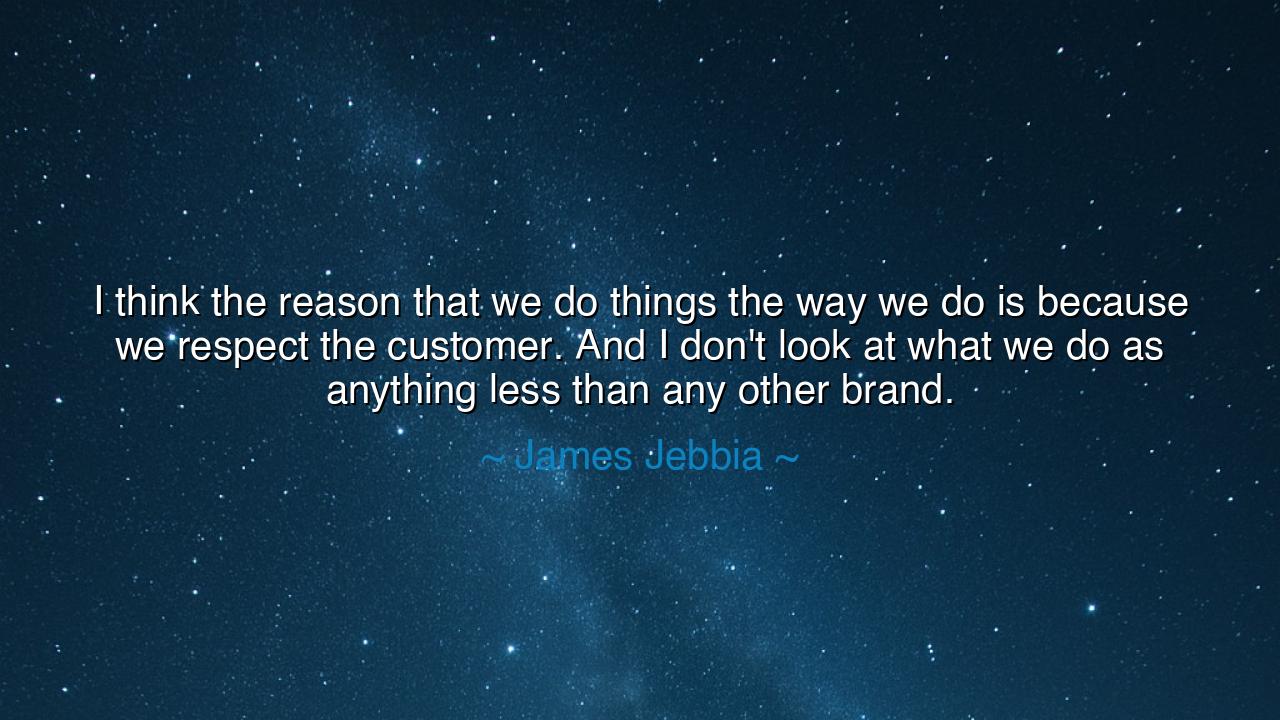
I think the reason that we do things the way we do is because we
I think the reason that we do things the way we do is because we respect the customer. And I don't look at what we do as anything less than any other brand.






In the words of James Jebbia, founder of the legendary brand Supreme, we hear the quiet conviction of a craftsman who values integrity above glory: “I think the reason that we do things the way we do is because we respect the customer. And I don't look at what we do as anything less than any other brand.” These words, though simple, pulse with the spirit of honor — the belief that true worth is not measured by status or size, but by respect, by the sincerity with which one serves. In this declaration, Jebbia speaks not merely of clothing, but of a philosophy of creation, one that honors both the maker and the one for whom the work is made.
To respect the customer is to recognize the sacred bond between creator and community. It is to see commerce not as transaction, but as dialogue — a conversation built on trust, care, and authenticity. Jebbia began his journey not as a mogul, but as a man who understood culture from the ground up. His store was not a temple of luxury, but a gathering place for skaters, artists, and youth seeking identity in a world of noise. In a time when many brands sought to imitate wealth, Jebbia sought to honor authentic expression. And so, his respect for the customer became his compass — a principle that guided every release, every product, every decision.
The origin of these words lies in a world of contradiction — the world of fashion, where image often outweighs substance. Yet Jebbia refused to treat his customers as faceless consumers to be exploited. He saw them as equals, as collaborators in a shared story. This humility gave birth to something extraordinary: a brand that transcended the marketplace and became a movement. In his eyes, the customer was not a buyer, but a believer — one who deserved honesty and excellence, regardless of price or prestige. To serve such people was not a duty, but an honor.
There is an ancient parallel to this wisdom. In the markets of old Kyoto, the tea masters who crafted porcelain cups did so with reverence. Though their work might seem small, each vessel was shaped as if for a king. One master, Rikyu, once said, “Treat the common as sacred, and the sacred as common.” He meant that true respect knows no hierarchy — that greatness lies not in the magnitude of what one makes, but in the heart with which it is made. This is the spirit that Jebbia embodies: the craftsman’s pride, the refusal to see his work as lesser, even in a world obsessed with grandeur.
To say “we respect the customer” is to affirm a moral order — that creation must serve people, not ego. When Jebbia says, “I don’t look at what we do as anything less than any other brand,” he rejects the poison of comparison. He reminds us that worth is not bestowed by critics, luxury houses, or investors, but by authentic purpose. This truth is timeless: whether you build a palace or print a T-shirt, the measure of your work lies in its sincerity. The potter, the farmer, the writer, the designer — all stand equal when they create with integrity.
Jebbia’s journey also teaches us of humility’s power. Supreme, though born in a small space on Lafayette Street, came to rival giants not through marketing or pretense, but through the steady cultivation of respect — respect for culture, for community, and for craft. Its creator did not chase status; he built trust. And from that trust rose a legacy that cannot be purchased, only earned. His words remind us that greatness does not announce itself with noise; it grows quietly, nourished by consistency and care.
So, my children, take this lesson to heart: whatever you create, create it with respect — for your craft, for your audience, and for yourself. Do not belittle your work because others do not yet see its worth. Every true creation begins in obscurity, and every lasting name is forged through humility. When you labor, do so with the reverence of one serving something eternal. Remember that respect is the soil in which greatness grows, and that no work done with love and integrity is ever small.
For in the end, the wisdom of James Jebbia stands as a call to all makers and dreamers: Do not seek to be “greater” than others. Seek only to be true. Treat every person you serve as worthy of your best, and every act of creation as a sacred offering. Then, whether the world calls you a brand, a business, or an artist, you will know this deeper truth — that to respect those you serve is to honor the divine purpose of work itself.






AAdministratorAdministrator
Welcome, honored guests. Please leave a comment, we will respond soon